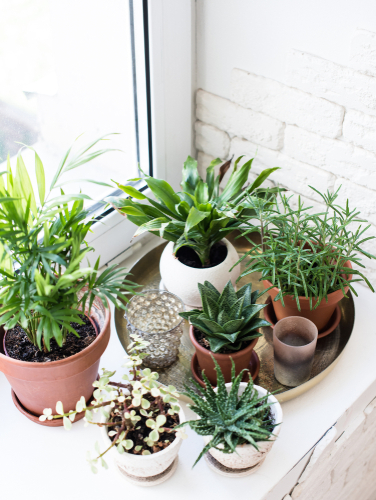Could Mother Nature Hold The Key To Happiness?
Feeling blue? Find out how 'green therapy' could help lift your spirits

Crisp green grass. Branches swaying in the wind. Birds chattering between the trees. Sounds like bliss, right? We love stepping out into nature at Live Green & Good. But, particularly in these cold winter months, it can be difficult to find the time and energy to enjoy the great outdoors – whether it’s simply to breathe in some fresh air, stretch our legs, or enjoy an outdoor activity.
Research in 2019 showed that almost half of British women don’t have enough time to enjoy nature, amidst hectic work schedules and family commitments. Of the 2,000 women polled, seven in 10 agreed that going too long without being able to spend time in nature negatively affects their mood. But the benefits of being outdoors are numerous: it decreases anxiety levels, reduces stress, and boosts your mood and overall sense of wellbeing. So, it seems that time spent in Mother Nature is just what the doctor ordered, as the concept of ecotherapy becomes increasingly popular.
What is ecotherapy?
We often talk about taking care of our health in terms of eating a wholesome diet and getting regular exercise, but a healthy mind is equally as important as a healthy body. If you’ve spent time outdoors, you’ll probably fully appreciate the way it can make you feel. But now, doctors and specialists are advocating the benefits, too, and it’s taking the form of a new type of therapy that’s both free and natural – that’s a win-win in our books!
Ecotherapy is essentially a way of connecting with nature on some level. Whether you’re walking in the countryside, spending time with animals, or gardening, you’re likely to feel the impact both physically and mentally. What’s more, at this time of year, being outside in natural light is a great way of beating the winter blues and combating the effects of Seasonal Affective Disorder.
Ecotherapy could involve working in nature – whether that’s through a conservation project, gardening or farming – or it could revolve around simply experiencing nature: cycling through the park or strolling along the beach, for example.
Take five
So how can ecotherapy help you? The beauty of it is that even just five minutes spent outdoors can help you regain focus, relax and feel more positive – it’s also one of the cheapest forms of therapy there is! Perhaps you can spend a few minutes on your lunch break walking outdoors, or if the sun is out, take your lunch al fresco! If you typically spend your evenings in the gym, consider going for a run or cycle outdoors instead, or even grab your weights for an outdoor training session. On weekends, try to find more time for a longer walk in nature, or consider joining a group of walkers or runners for extra motivation.
When we have a bit more time, one of our favourite outdoor activities is gardening, and even doctors are now prescribing the activity to help relieve anxiety and depression. Along with singing and arts and crafts, the alternative treatment is becoming increasingly popular, and is even being advocated by the NHS to improve and manage mental health and other conditions. The beauty of gardening is that you can invest as much or as little time and effort as you’d like. The colour, smells and sounds of the garden will lift your spirits, whilst nurturing plants and produce will bring a great sense of satisfaction. Plus, even if it all goes to pot (sorry!), you can simply start again. There are also some great communal gardening projects and schemes that could help you meet other people along the way. Spending time socialising while doing something you enjoy is a great way to boost your mood and increase positive energy! No matter how you spend your time, remember that nature is there for us to appreciate and respect. Trees are vital for carbon storage, while they and other plants provide sustenance and habitats for creatures great and small. The more we support green spaces, the more likely they’ll be protected for future generations to enjoy.

Bringing nature indoors
We’d all love to spend the majority of our day outside, but what if you could bring the great outdoors inside? No, we’re not talking about watching Blue Planet – though that is a LG&G team favourite. We’re talking about plant therapy. Studies suggest that keeping houseplants can help to improve concentration, reduce stress and boost our mood. Part of this is simply the visual stimulation of seeing greenery, but the act of caring for plants has its own positive benefits. There’s a variety of plants available to fit any space, from small succulents to hanging ferns and tall palms. Some are super-easy to care for, and can be kept anywhere, from your kitchen windowsill, to a bedroom shelf or in the bathroom. You can even incorporate houseplants into your décor by creating displays in recycled glass bowls! You could also combine the gardening aspect with growing edible plants such as herbs, sprouts, and chillies indoors. So, while it’s still great to spend time outdoors, adding a bit of foliage to your home could also help improve your mental health for those days when you simply can’t get out. When it comes to improving your mental health, every little bit helps.
Want to read more like this? Sign up to our weekly newsletter, The Edit, to receive the latest updates on sustainability, planet-friendly recipes, cruelty-free beauty and more straight to your inbox.











